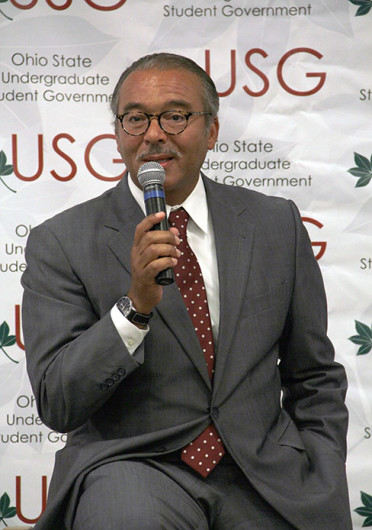
Columbus Mayor Michael Coleman speaks at an Undergraduate Student Government meeting Oct. 1 about the Columbus Education Plan. Credit: Ritika Shah / Asst. photo editor
Imagine, for a moment, if the outcome of your career, income and education were in the hands of an unregulated group of individuals manipulating the “system” for their own benefit. Imagine that even if those individuals were removed from power, the extent of your success was still decidedly constrained.
Thankfully for current college students, this is nothing more than a worst case scenario … but for more than 50,000 students in the Columbus City School district, this is reality.
In 2012, a scandal broke when The Columbus Dispatch uncovered administrators had progressively manipulated student data more and more over the course of several years in order to improve the district’s grades during the Ohio Department of Education’s annual assessment.
Higher scores from the ODE mean more school funding and oftentimes higher pay for teachers. But what does this mean for students?
This demolition of integrity in the district has proved detrimental for Columbus City School students. Columbus Mayor Michael Coleman said at an Oct. 1 meeting with Ohio State’s Undergraduate Student Government that more than 50 percent of Columbus Public students attend “failing” schools.
”Education is the one thing that cuts through everything, it touches every part of our lives,” Coleman said.
A lack of education does more than just affect a student’s report card, it affects their potential career, income and every aspect of the city for years to come.
The solution? Issues 50 and 51 on the ballot this November.
Coleman and other officials gathered a commission of citizens from all walks of life to represent the city: teachers, parents, faith leaders, people in a wide range of professions. Through expert opinion and intervention, the Columbus Education Plan was proposed.
Coleman described this plan as, “not a transformation of public education, but a revolution of public education that will change education in (Columbus) for generations to come.”
First and foremost, this plan requires a law change. Issue 51 specifically calls for an independent auditor that would now review all data and financial information and serve as a “checks and balances” system for the newly hired school board officials.
Issue 50 is a levy that includes but is not limited to: pre-kindergarten programs, integrating innovative and necessary technology into the curriculum and recruiting and maintaining the best teachers.
Updating learning materials is also a quintessential element of the Columbus Education Plan. Coleman noted some Columbus schools are using math textbooks more than 10 years old.
As a member of USG, I felt particularly moved by Mayor Coleman’s address, which is why I felt the need to reach out to the Ohio State community to get involved.
As students at a prestigious university, we all share at least one thing: at one point, we had the opportunity, the teacher, the coach, the class, or the parent that helped us decide that one day, we wanted to be where we are now. That opportunity may not be a specific time we can all remember, because for most of us, we took this luxury for granted.
The students being hit the hardest by the downfall of the school district are not even old enough to vote and attempt to change their circumstances. We are. We not only have the age, but the voice and the power to make a change for our community and for future generations in Columbus.
“We’re all to blame,” Coleman said. “That’s why our children are failing, we look the other way.”
I believe that we have a duty to vote and give Columbus students the quality education and support that we received and they deserve.


